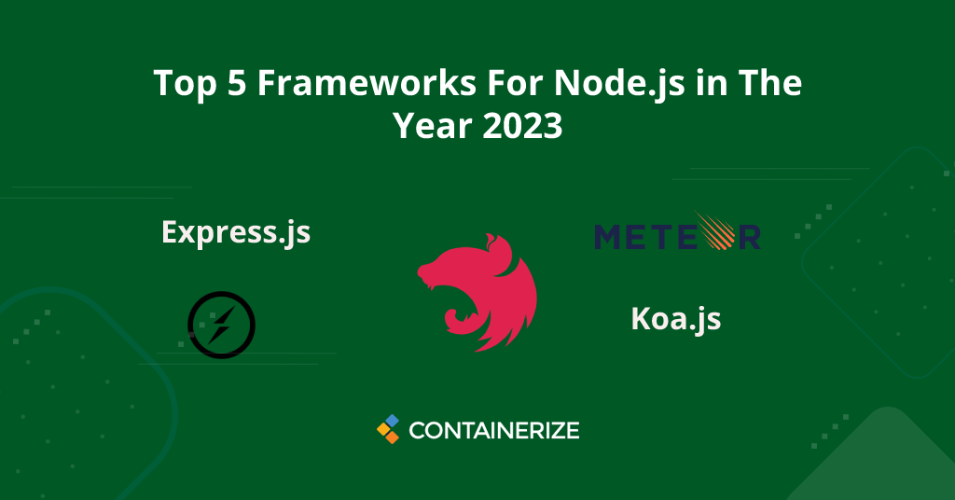Explore the most popular backend frameworks and opt for the right option to build scalable enterprise-level applications. Node.js is the first choice of devs.

Overview
In our previous blog post, we publish a getting-started guide with Node.js in which we thoroughly covered Node.js architecture and its applications. Since our series on JavaScript tutorials is still on so we are going to learn about the top 5 frameworks for Node.js. In this Node.js tutorial, we are going to cover very popular rich-featured server-side frameworks for Node.js programming. This open-source JavaScript run-time environment has opened new horizons for JavaScript developers. In addition, this stack enables developers to work on the front end and back end both. Therefore, please read this article from start to end and you will end up with a strong knowledge of Node.js frameworks.
Node.js frameworks are as follows:
Nestjs
Nestjs is one the most popular backend frameworks in JavaScript. It is widely used to build scalable business applications. Further, this Node.js framework offers support for TypeScript and its architecture is inspired by Angular. In addition, Nestjs leverages the feature of Expressjs and is highly extensible as it offers integrations with third-party libraries.
This JavaScript framework offers rich scaffolding options. Moreover, you can create a project simply by running the command in the terminal. Above all, it is fast, efficient and makes your code maintainable. However, you can achieve abstraction and a modular approach to building applications. There are a number of modules available in its library pool to configure databases, ORM, and more.
So, you can install this Node.js framework by running the following command in the terminal:
npm i -g @nestjs/cli
Express.js
Express.js is another top-level framework for server-side programming. It is considered the fastest and go-to Node.js framework when it comes to developing the back end of web-based applications. Further, its architecture is based on MVC(Model, View, Controller). Further, Express.js is a highly matured framework and there is a huge number of modules developed to enhance its functionality.
This backend framework also offers support for TypeScript. In addition, Express.js lets you opt for a modular approach and you can leverage rich routing features to build scalable I/O-intensive apps. Above all, it is the first choice of developers for building REST APIs.
Finally, you can install Express.js by running the following command:
npm install express --save
Koa.js
Koa.js offers many similarities with Express.js in terms of features and code style. This is one of those frameworks for Node.js that offer high-level of error handling. Further, you can write maintainable, and clean code to perform rapid application development. Koa.js is highly robust and handles async calls quite efficiently.
Moreover, it has a huge developers community and provides rich error-handling techniques. Since it is very similar to Express.js so it is quite easy for Express.js developers to adapt to Koa.js.
You can install this Node.js framework simply by running the following command into the terminal/CMD:
$ npm i koa
Socket.IO
Socket.IO is the top choice when it comes to developing real-time applications such as remote collaboration apps, chat apps, and more. This is one of the Node.js frameworks that are highly scalable, reliable, and offer event-based communication. Moreover, Socket.IO has server-side implementations in multiple programming languages such as Java, Python, Golang and more.
There are rich debugging and logging features in this server-side framework. In addition, it also offers automatic reconnection, acknowledgments, multiplexing, and more. Above all, Socket.IO also offers support for TypeScript.
Please run the following command to install its server-side implementation for Node.js:
npm install socket.io
Meteor.IO
Meteor.js is an ideal selection when you are building scalable, efficient, and data-intensive applications. It offers smooth communication between the client and the server. Like other frameworks for Node.js, Meteor.js also offers rich CLI options to build prototypes. In addition, there is a vibrant community that supports this Node.js framework.
Moreover, it is easy to get started and offers a full-stack solution. You can integrate it with other server-side frameworks and hence, you can build modern web applications.
Run the following command in the terminal to install this Node.js framework:
npm install -g meteor
Conclusion
This brings us to the end of this Node.js tutorial. We have gone through the top 5 frameworks for Node.js which include Express.js, Nestjs, and more. In addition, there is a brief introduction to all these Node.js frameworks which will help you in making the right choice among them.
Connect with us
Finally, containerize.com offers ongoing tutorials on different JavaScript topics. Therefore, you can stay in touch by following us on our social media platforms, including Facebook, LinkedIn, and Twitter.
Ask a Question
You can let us know about your questions or queries on our forum.
FAQs
Which framework goes best with Node.js?
Please go through this guide to know the most popular backend frameworks for Node.js.